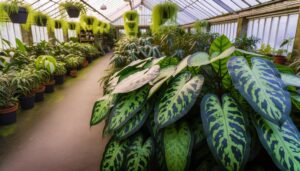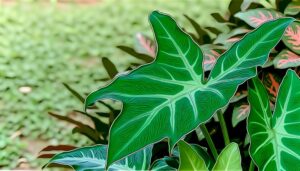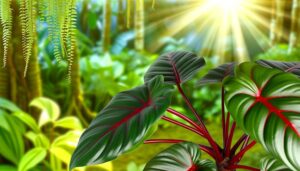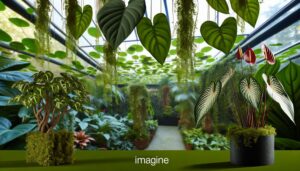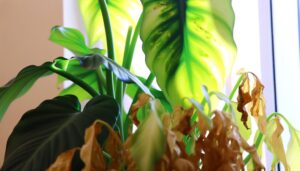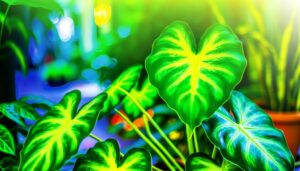Where Can I Find Seeds for Philodendron Erubescens?
Philodendron erubescens seeds can be sourced through reputable online seed retailers and specialty plant shops. These vendors guarantee high genetic diversity and plant health standards.
Specialty shops often offer unique varieties and expert advice on propagation and pest management. International seed banks also preserve and provide access to these seeds, maintaining them under ideal conditions.
Additionally, gardening clubs and plant enthusiast forums offer community-based exchanges and knowledgeable support. Eco-conscious seed companies are another viable option, focusing on sustainable practices and biodiversity.
For further insights into obtaining and cultivating these seeds, additional information awaits.
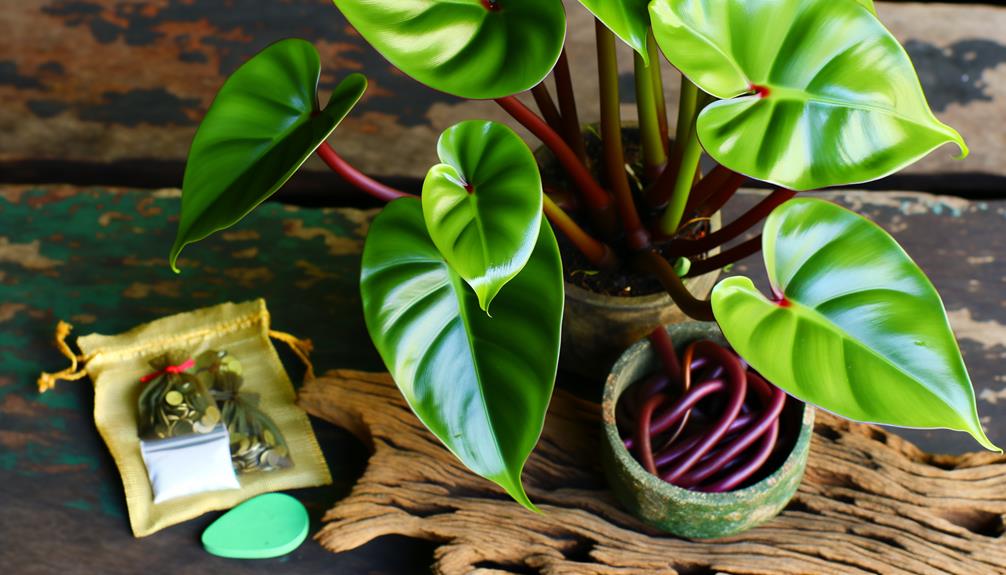
Key Takeaways
- Trusted online seed retailers provide Philodendron erubescens seeds with detailed germination guides.
- Specialty plant shops offer unique varieties of Philodendron erubescens and expert advice.
- International seed banks store and catalog Philodendron erubescens seeds under ideal conditions.
- Online gardening communities facilitate rare seed procurement and cultivation support.
- Eco-friendly seed companies emphasize sustainable practices and biodiversity in seed production.
Online Seed Retailers
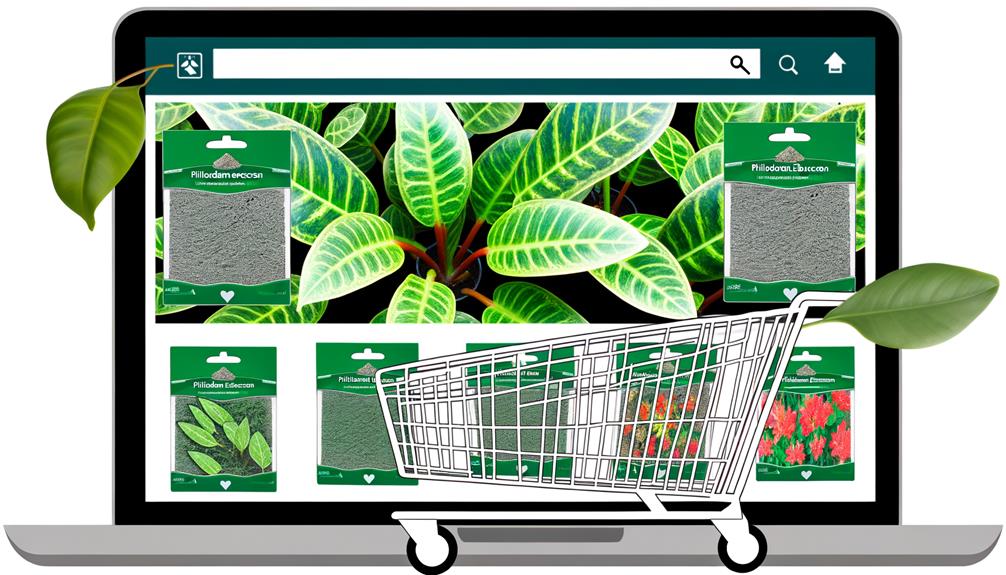
Exploring trusted online seed retailers is crucial for acquiring high-quality Philodendron Erubescens seeds, as it ensures genetic purity and highest germination rates. Trusted sources often provide detailed descriptions of the seed provenance, guaranteeing that the genetic lineage remains untainted.
These retailers frequently include detailed germination guides, which are vital for maximizing the success rate of cultivation. Additionally, they are likely to adhere to strict storage and handling protocols, maintaining excellent seed viability.
Customer reviews and ratings on these platforms can offer valuable insights into seed quality and service reliability. By selecting well-reviewed and scientifically verified online seed retailers, horticulturists can achieve more consistent and predictable outcomes in their Philodendron Erubescens propagation efforts.
Specialty Plant Shops
Specialty plant shops offer an unmatched opportunity to access rare plant varieties, including Philodendron erubescens, that are often unavailable through standard retailers.
These establishments typically employ expert staff who provide valuable guidance on the best cultivation and care practices necessary for these unique specimens.
Additionally, the curated environment of a specialty plant shop enhances the overall shopping experience, allowing enthusiasts to explore a diverse selection of botanicals in a setting designed to inspire and educate.
Rare Plant Varieties
For enthusiasts seeking rare plant varieties like Philodendron Erubescens, specialty plant shops serve as invaluable resources, offering not only unique species but also expert knowledge on their cultivation and care. These shops often stock a curated selection of hard-to-find plants, sourced from reputable growers and conservation programs.
Their inventory typically includes Philodendron Erubescens, known for its striking red stems and lush foliage. By focusing on rare varieties, these specialty shops maintain a high standard of plant health and genetic diversity. They often utilize advanced propagation techniques, such as tissue culture and selective breeding, to make sure the availability of robust, disease-free specimens.
This commitment to quality ensures that enthusiasts receive plants that thrive under ideal conditions.
Expert Staff Guidance
Knowledgeable plant specialists at specialty plant shops play a crucial role in providing expert guidance on the care and cultivation of rare species like Philodendron Erubescens. These professionals offer invaluable advice on ideal growing conditions, pest management, and propagation techniques. Their expertise extends to understanding the specific requirements of light, humidity, and soil that this tropical plant needs to thrive.
| Aspect | Expert Recommendations |
|---|---|
| Light | Intense, indirect light |
| Soil | Well-draining, abundant in organic matter |
| Humidity | Elevated humidity, approximately 60-70% |
| Watering | Maintain soil consistently moist, not waterlogged |
Such detailed guidance ensures that enthusiasts can successfully nurture their Philodendron Erubescens, achieving robust growth and colorful foliage. By leveraging their specialized knowledge, these experts help bridge the gap between novice and advanced horticulture.
Unique Shopping Experience
In addition to offering expert guidance, plant enthusiasts find that shopping at specialty plant shops provides a unique and enriching experience, characterized by access to rare and exotic species like Philodendron Erubescens, curated displays, and a community of like-minded individuals. These shops often feature meticulously arranged collections that highlight the botanical diversity and aesthetic appeal of each plant. The structured environment allows for easy navigation and discovery of new varieties.
Moreover, specialty shops are often staffed by passionate horticulturists who can provide in-depth knowledge about plant care, propagation, and growth conditions. The sense of community fostered within these establishments enables enthusiasts to exchange ideas, tips, and even plants, thereby enhancing their overall botanical journey.
Local Nurseries
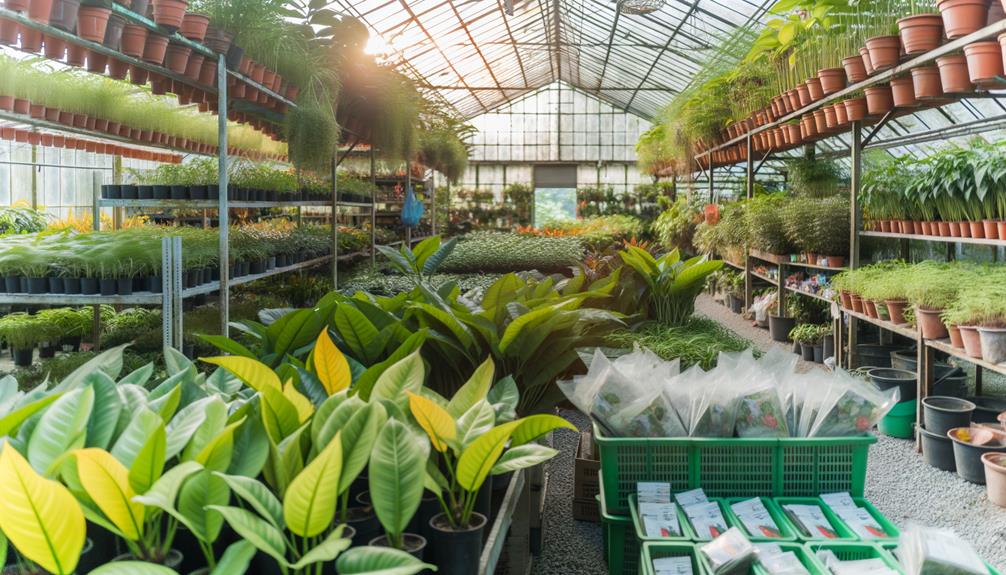
Local nurseries provide an invaluable resource for procuring high-quality seeds for Philodendron erubescens, offering well-curated selections and expert advice on ideal growing conditions. These establishments often maintain close relationships with reputable seed suppliers, ensuring genetic diversity and high germination rates.
Nursery professionals can offer guidance on soil composition, humidity, and light requirements specific to Philodendron erubescens, enhancing the likelihood of successful cultivation. Additionally, local nurseries may stock companion plants and recommend organic fertilizers to promote robust growth.
Botanical Gardens
Exploring botanical gardens can yield access to rare and diverse seeds for Philodendron erubescens, often accompanied by detailed information on their ecological and horticultural requirements.
Botanical gardens serve as repositories of plant biodiversity, offering seeds that are meticulously documented and preserved. Many gardens have seed banks specifically for rare or endangered species, including Philodendron erubescens. These institutions often collaborate with researchers and horticulturists, providing scientifically validated information on best growth conditions.
Visitors may also benefit from educational programs and expert consultations. Additionally, botanical gardens often participate in seed exchange programs, enhancing the availability of diverse genetic material.
Engaging with these resources enables enthusiasts to cultivate Philodendron erubescens with a strong foundation of scientific knowledge.
Plant Enthusiast Forums
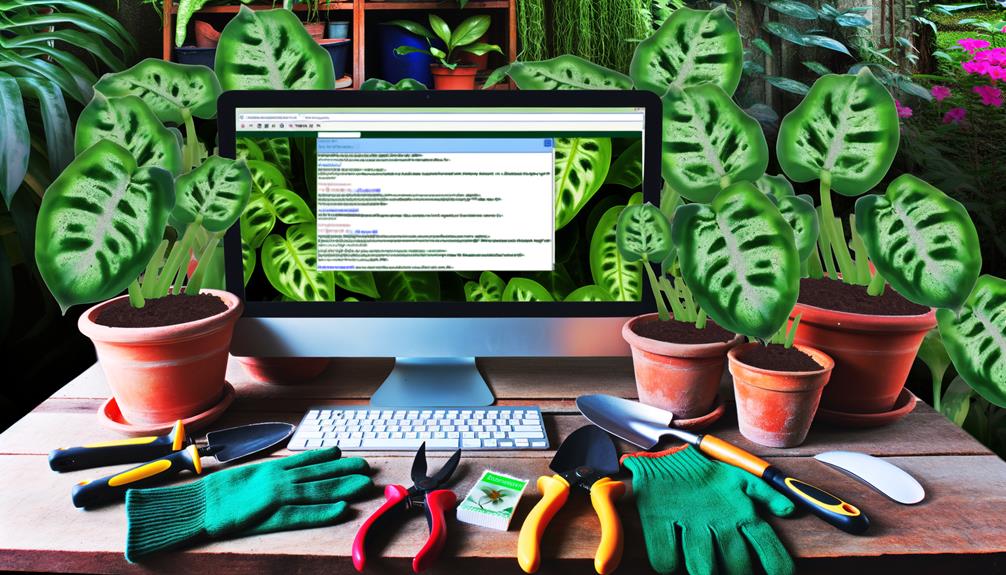
Frequently, plant enthusiast forums provide a wealth of collective knowledge and experiential insights on cultivating Philodendron erubescens, offering detailed advice that complements scientific literature and horticultural guidelines. These forums serve as interactive platforms where seasoned growers share their successes and challenges, thereby creating a rich repository of practical information. Critical discussions often revolve around seed sourcing, best germination conditions, and pest management strategies. Below is a table summarizing commonly discussed topics and their benefits:
| Topic | Description | Benefit |
|---|---|---|
| Seed Sourcing | Recommendations for reputable vendors | Ensuring high-quality seeds |
| Germination Techniques | Detailed steps for successful germination | Improves germination rates |
| Soil and Nutrient Needs | Specific soil mixes and fertilizers | Supports healthy plant growth |
| Pest and Disease Control | Identifying and managing common issues | Minimizes plant morbidity |
| Propagation Methods | Techniques for propagating cuttings | Broadens plant collection |
These forums are invaluable for both novice and advanced horticulturists.
Social Media Groups
Social media groups dedicated to Philodendron erubescens cultivation provide dynamic and immediate interactions that facilitate the exchange of real-time advice, troubleshooting, and innovative growing techniques among enthusiasts. Platforms such as Facebook and Instagram host numerous specialized groups that serve as repositories of collective knowledge.
Members frequently share their experiences regarding seed sourcing, germination protocols, and best growing conditions. These communities often feature expert horticulturists who can answer specific questions and offer guidance on rare seed procurement.
Additionally, these groups enable members to post photographs and videos, fostering a visual learning environment that can be particularly beneficial for identifying and resolving common cultivation issues. Engaging in these groups can greatly enhance one's understanding and success in growing Philodendron erubescens from seeds.
Plant Swaps and Exchanges
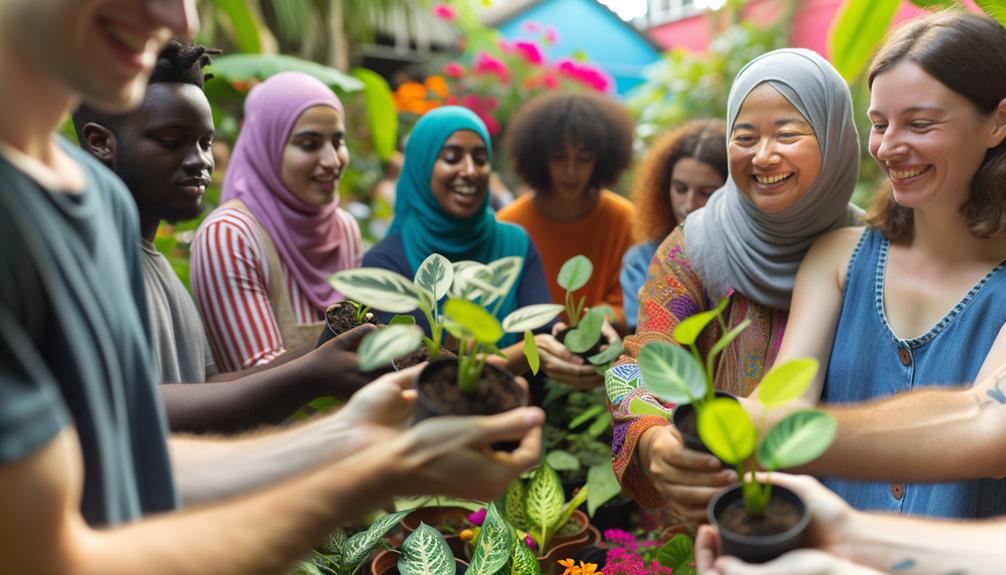
Plant swaps and exchanges offer an invaluable opportunity for Philodendron erubescens enthusiasts to diversify their collections and obtain rare seeds through direct, often community-based, trading systems. These events, typically organized by local gardening communities or botanical societies, enable participants to share seeds, cuttings, and plants, fostering a culture of mutual benefit and biodiversity conservation.
Participants often bring surplus plant material to trade, which minimizes waste and promotes genetic diversity. Additionally, plant swaps provide a platform for exchanging cultivation tips and establishing connections with fellow horticulturists. The face-to-face interactions inherent in these events facilitate the exchange of knowledge regarding ideal growing conditions, pest management, and propagation techniques, enhancing the overall success in cultivating Philodendron erubescens.
Gardening Clubs
Gardening clubs provide another dynamic avenue for Philodendron erubescens enthusiasts to acquire seeds and expand their botanical knowledge through structured group activities and organized events. These clubs often host seed exchanges, workshops, and guest lectures, offering unique opportunities to learn from experienced horticulturists and botanists. Additionally, members can access exclusive seed banks maintained by the club.
| Activity | Description |
|---|---|
| Seed Exchanges | Swap seeds with fellow members |
| Workshops | Hands-on sessions on plant care and propagation |
| Guest Lectures | Talks from experts in the field of botany |
| Exclusive Seed Banks | Access to rare and exotic seeds |
| Plant Sales | Purchase plants and seeds at member discounts |
Joining a gardening club fosters a community environment conducive to sharing resources and knowledge, making it an invaluable resource for any plant enthusiast.
International Seed Banks
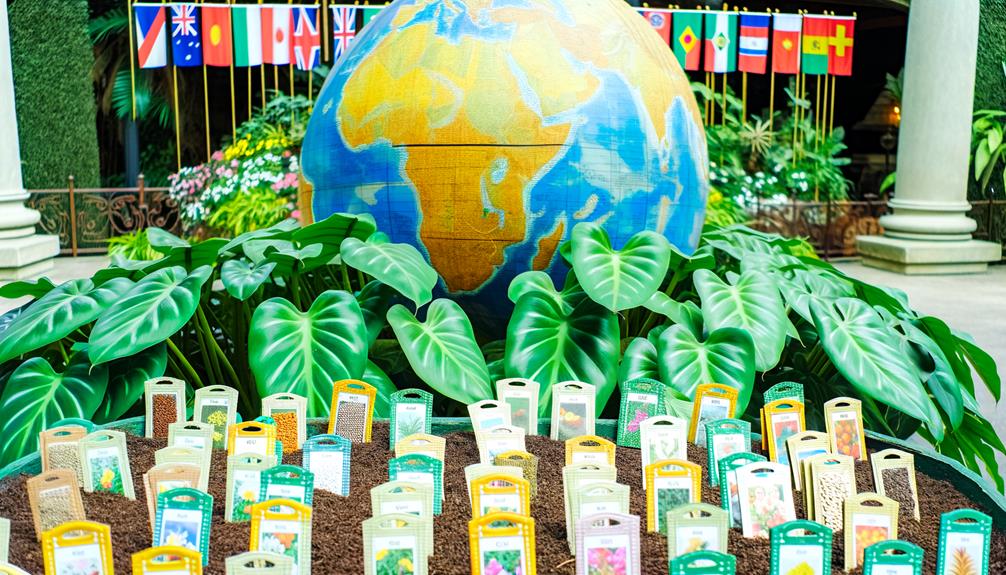
International seed banks play a pivotal role in preserving the genetic diversity of Philodendron erubescens and other plant species by storing seeds under ideal conditions for long-term viability. These institutions meticulously catalog and maintain seed samples, ensuring that rare and endangered species are safeguarded against extinction.
The seeds are stored in controlled environments that regulate temperature and humidity, which are critical in maintaining their viability over extended periods. Through international collaboration, seed banks provide a repository of genetic material that can be used for research, restoration, and cultivation.
This invaluable resource allows for the propagation of Philodendron erubescens in diverse environments.
Hope for future generations
Biodiversity preservation
Scientific research support
Global ecological restoration
Eco-Friendly Seed Companies
In addition to seed banks, eco-friendly seed companies contribute greatly to the preservation and propagation of Philodendron erubescens by implementing sustainable practices and offering ethically sourced seeds. These companies often emphasize biodiversity and environmental stewardship, ensuring that seeds are harvested without disrupting natural ecosystems.
They frequently adopt organic farming methods, reducing reliance on synthetic chemicals that could harm soil health and local flora and fauna. Moreover, eco-friendly seed companies usually engage in fair trade practices, supporting local communities and promoting economic sustainability. Their transparent sourcing methods enable consumers to make informed choices, fostering a market for responsibly produced seeds.
Conclusion
The pursuit of procuring philodendron erubescens seeds can be navigated through numerous avenues like online seed vendors, specialty plant stores, and nearby plant nurseries.
Moreover, botanical gardens, plant enthusiast communities, and plant exchanges provide ample sources.
Gardening groups, global seed repositories, and environmentally conscious seed businesses additionally offer fertile grounds for discovering these seeds.
The combination of these diverse locations guarantees a thorough and united approach to obtaining the seeds, promoting both horticultural diversity and botanical beauty.

